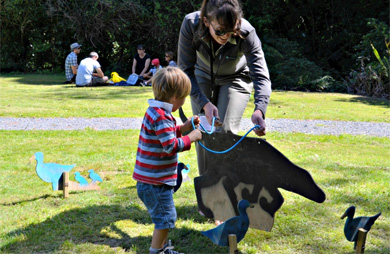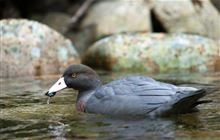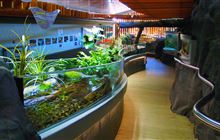Fun, free whio day a success
Archived content: This media release was accurate on the date of publication.
Introduction
A fun, free, whio day, full of family activities was enjoyed by visitors to Tongariro National Trout Centre on Sunday March 19.Date: 23 March 2017
The event was hosted by the Whio Forever partnership between Genesis Energy and the Department of Conservation as part of national Whio Awareness month celebrations.
Over 70 children explored the site throughout the day on a nature scavenger hunt, and tested their balance, observation and other skills in the Whio Ranger Obstacle Course.
Neo and Beau the whio conservation dogs were a big hit!
Captive bred whio awaiting release to the wild were a big drawcard in the whio enclosure.
Lots of creative entries were placed in the Whio Forever colouring competition. Enter this and other competitions before 13 April.

Learning the skills of a conservation dog handler
Image: Sarah O'Sullivan ©
The event will be back again next year for those who missed out this time.
The support of Genesis Energy is enabling DOC to lift awareness of the whio, double the number of fully secure whio breeding sites throughout the country, boost pest control efforts and enhance productivity and survival for these rare native ducks.
Background information on whio
- The whio is a threatened species of native duck that is only found in New Zealand’s fast flowing waters. Featured on New Zealand’s $10 note and with an estimated nationwide population of less than 2500 birds, whio are rarer than kiwi.
- Whio are adapted to live on fast-flowing rivers so finding whio means you will also find clean, fast-flowing water with a good supply of underwater insects.
- This makes whio important indicators of ecosystem health – they only exist where there is high quality clean and healthy waterways.
Whio Forever
- Genesis Energy has a strong historic association with whio through the Tongariro Power Scheme and in 2010 this association grew through the establishment of Whio Awareness Month (March).
- Today, Genesis Energy and the Department of Conservation (DOC) continue their partnership through the Whio Forever Programme, which aims to secure the future of whio in the wild and ensure New Zealanders understand and value of whio in our rivers.
- The support of Genesis Energy and the work of DOC has enabled the Whio Recovery Plan to be implemented.
Conservation issue
- The whio are eaten by stoats,ferrets and cats, with the largest impact during nesting time when eggs, young and females are vulnerable, and also when females are in moult and can’t fly.
- Extensive trapping can manage these predators and work in key whio habitats by DOC and Genesis Energy on the Whio Forever Project has already seen an increase in whio numbers.
- Whio cannot be moved to predator-free islands like other species because of their reliance on large fast-flowing rivers.
- Pairs occupy approximately 1km of water – so they need a lot of river to sustain a large population and they fiercely defend their territories, which makes it difficult to put them with other ducks in captivity.
- They are susceptible to flood events which, destroy nests, fragment broods and wash away their valued food source.
Related links
Contact
Amelia Willis, DOC Community Ranger
Mobile: +64 27 886 3652
Email: awillis@doc.govt.nz



